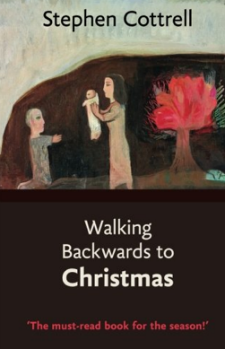Walking Backwards to Christmas
Clever retelling of the Nativity story in reverse
 Walking Backwards to Christmas
Walking Backwards to Christmas
By Stephen Cottrell
SPCK Publishing
ISBN 978-0-281-07147-7
Reviewer: David Stuckey
With a title that echoes a festive nonsense song by Spike Milligan and a writing style reminiscent of David Kossoff, Bishop Stephen Cottrell takes a far from straightforward look at the Christmas story - but it is nevertheless one which beguiles and enchants.
The path he has chosen is similar to watching Who Do You Think You Are? - tracing a lineage from the present back into the past, but not always showcasing the usual suspects. So, for instance, when the infant Jesus is presented at the temple and is recognised by Simeon as the one who was foretold, it is given to the prophetess Anna to describe the moment ..."the sun will rise tomorrow, but on a different world, one into which a greater light has come."
And Rachel, "weeping for her children", is chosen to describe the action of Herod's henchmen, executed maybe with more than a little hesitancy. Facing the soldier Rachel says "my eyes pleaded with him. He saw my utter helplessness, but ... "We have our orders" he said. He pulled a slim steel blade from beneath his tunic and did the deed with slick precision "as you might slice a fig on a summer's day."
Even Herod has doubts about the slaughter he ordered, according to Bishop Stephen. "Do it swiftly and diligently" he says, reasoning that his solution is regrettable yet expedient.
A wise man, a shepherd, even Joseph, are all given a voice, together with the inn-keeper's wife, here identified as Martha. She felt "a strange and ominous foreboding ... (which) lit a spark of pure uncompromised joy. Who isn't moved to wonder at the sight of a newborn child?"
Mary herself, bearing a son who would be the light of the world, sums it up simply. "I am the Lord's lantern. He has kindled a fire within me." And this topsy-turvy book ends at the start with the prophesies of Moses and Isaiah.
This exercise in retelling the Nativity in reverse "for all those who thought they knew the story well" as Bishop Stephen suggests in his prologue (or should that be epilogue), is clever, dramatic and thought-provoking. But does this roundabout approach lead anywhere?
A young shepherd called David muses "if this child is king how will anyone know? Will he lead an army to victory? Will he kick out the Romans and establish an empire? I can't see it - not in this manger ... (but then) this is a different sort of king."
And this is indeed a different sort of book. You may never look at the Sunday School Nativity in the same way again.
David Stuckey is a journalist and member of Maghull Baptist Church
Baptist Times, 04/11/2014